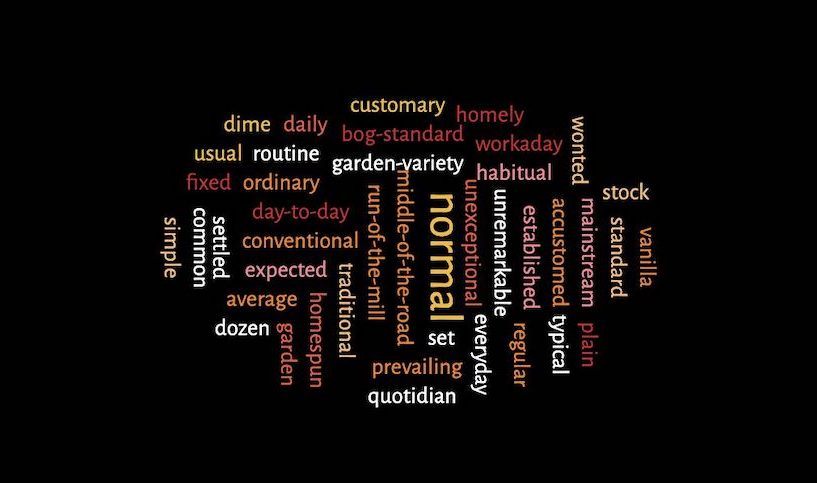Normal is an illusion. What is normal for the spider is chaos for the fly. ~Charles Addams
These are extraordinary times. Who knew in December that a virus would bring the world to a virtual standstill? I don’t know about you, but I didn’t put “Spend 100+ days stuck in my house with only my family for company,” on my list of New Year’s Resolutions for 2020. This year has not been normal.
The result for everyone – and I mean everyone – is the involuntary need to redefine normal. It isn’t normal to be confined to my house for not just days, but months. It’s not normal that whole swaths of the world’s population stopped working. It isn’t normal that we have to make appointments to get groceries, or that we have to line up outside, wearing masks, and standing 2m apart. It’s not normal that everywhere I go there are arrows on the floor directing my route through the store, or that there are also big dots on which I must stand until the next dot is empty. I could go on and on about what isn’t normal anymore.
Our disappearing normal means we have experienced some form of loss nearly every day for months AND we have no idea what life is going to look like as sheltering restrictions lift. What makes this relevant is that we are already carrying a psychological and emotional load that takes up space and energy, and now we’re going to add back in all the things we did before …work, school, travel …living. We will unwittingly and unconsciously look for normal, and we will grieve yet again when it doesn’t materialize.
All of that to say we live with so much uncertainty that for some of us, the load is too much. If we had anxiety before all this started, I can only imagine how much more difficult it is to manage now. If we were struggling with anything at all before this novel coronavirus pandemic brought the world to its knees, then the chaos of now must be excruciating. This pandemic has destroyed the illusion we are, “Captains of our own fate.” Given that we don’t actually have control of the forces that impact our lives, what can we do to manage ourselves?
Here are some strategies that can make a difference. Practice until you don’t have to think about it to use them.
1 Accept there are things about life you can’t control. This seems like it should be self-obvious, but on some level we all entertain illusions about how much of life we actually have the power to control (not much).
2 Take responsibility for what you can control. We always have the power to control personal attitude, actions, and understanding. There’s so much more personal empowerment in that reality than most people realize.
3 Recognize that anxiety is the habit of mentally creating a future (or outcome) we don’t want and freaking out about it now. The antidote to this mental habit is learning to stay completely present. In other words, practice the power of now (a great book by the way).
4 Accept that you’ll have to learn to live with ambiguity ~ the uncertainty of not knowing. Bring your mental Self back to the present and ask yourself, “What’s the thing I need/need to do right now?”
5 Maximize your resources. Sometimes this is money, but not very often. Usually, “resources” are within ourselves but we don’t recognize them. We have courage, creativity, smarts, ideas etc. What we need to make this situation bearable. Sometimes, the resource we need is help. So, ask for it.
6 Spend time with good people who keep you balanced. We all get off balance occasionally and having people in our lives who have permission to speak to how much we’ve tilted at windmills is enough to stave off disaster.
Finally (and this is the important thing), use the power of ‘and.’ This little trick is magic. “I feel really anxious about [fill in the blank] AND I’m going to do it anyway/be okay/make a decision…whatever. When we use the word ‘and’ we move past the block of the feeling to action. Using ‘and’ allows us to acknowledge how we’re feeling about whatever it is, and then to move on to making a decision based on thinking rather than feeling. Here’s the key. We don’t try to convince ourselves that we don’t feel anxious, or that we shouldn’t feel angry, or that we don’t have a right to feel sad etc. We accept the feeling (see #1) without getting stuck there by acknowledging it and then moving on to what we do have the power to control (see #2). Does doing this make the situation any less painful/sad/or fearful? Probably not but using AND is empowering. There is always something you can do.
Susannah is a leading psychotherapist, registered professional counsellor and Master Practitioner in Clinical Counselling based in Canada. For more information, you can find her on Twitter @aboutthattrauma, Instagram @SuJo1963 and Facebook @william.associates.








